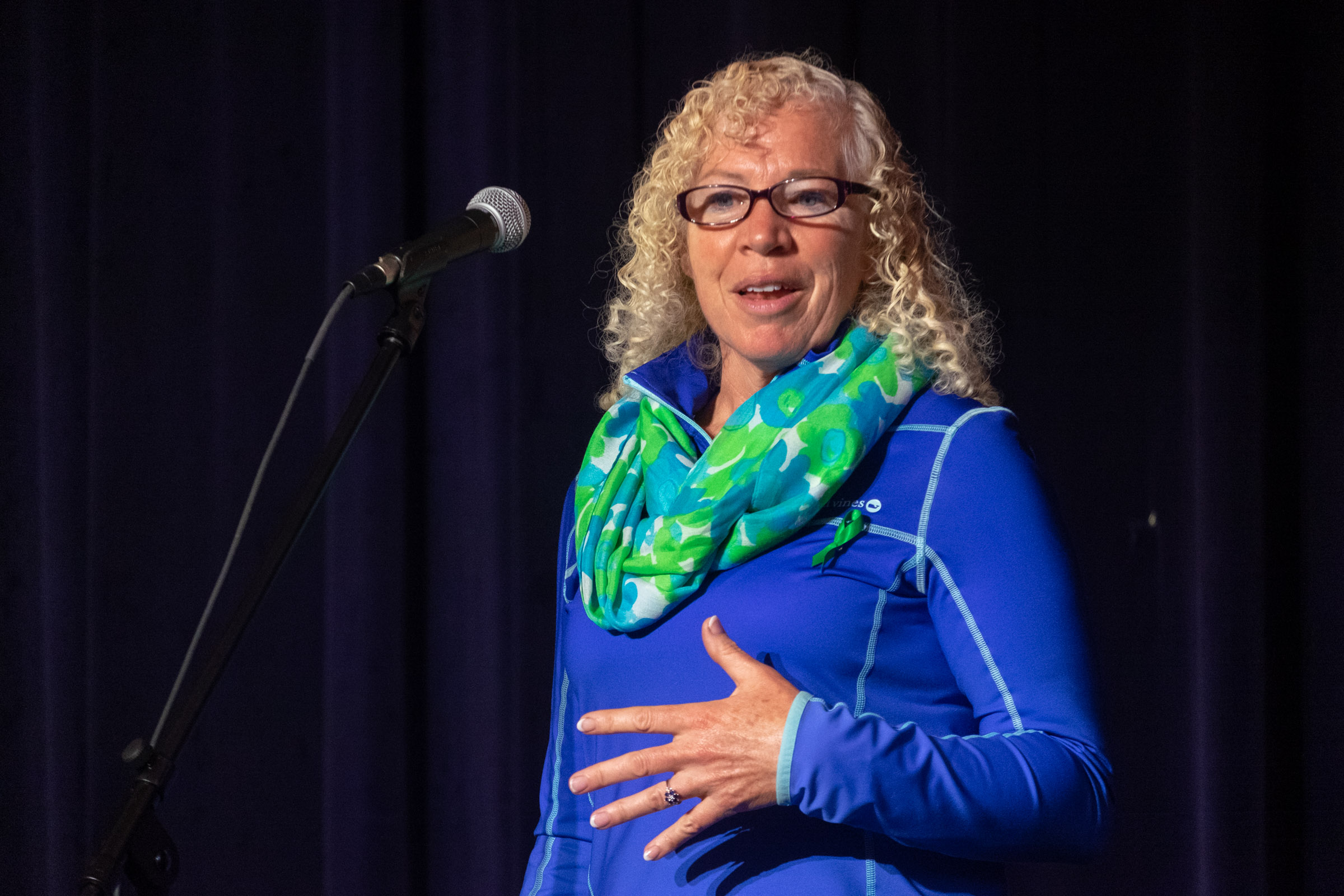In 2017, suicide was the 10th leading cause of death in the United States according to the National Institute of Mental Health. It was the second leading cause of death for people ages 10 to 34. The sobering statistics can make the issue seem daunting, especially in a small community like the Island that has been deeply affected by suicide. But in three weighty 90-minute presentations on the Island last week, advocate and author Craig Miller took on the issue and boiled it down to one story of overcoming suicide: his own.
Mr. Miller was invited to the Island to cap a series of events for mental health awareness month. He was a guest of the National Alliance on Mental Illness (NAMI) of Cape Cod and the Islands, and he shared his account three times during his visit: with students at the regional high school during an all-school assembly, with people incarcerated at the county jail, and with the public at the Katharine Cornell Theatre in Tisbury.
Each presentation was followed by a conversation with the audience. At the high school, students lined up to speak with Mr. Miller, NAMI regional coordinator Lisa Belcastro said. She said the audience at the jail also had multiple questions when the story concluded. At the Katharine Cornell Theatre, several community members shared stories of their own experiences supporting family and friends with mental illness. Jay Schofield spoke about the importance of letting people know they are needed.
“I want to thank you for going to the high school today. I spent 30 years teaching and coaching there,” Mr. Schofield said after Mr. Miller’s presentation. “All that time I ran across quite a few suicides.”
During his talk, Mr. Miller explained that he and other advocates are mindful about the way people discuss suicide. They avoid the word “commit” because it implies that there is a crime and someone is at fault. Mr. Miller said he also avoids the word “recovery.” He said recovery implies that something needs to simply be returned to its original state. He said facing mental health battles is more complex than that. It requires transformation.
“Michelangelo . . . when asked how it was that he created such beautiful lifelike sculptures, replied, ‘I saw the angel in the marble, and I carved until I set it free,’” Mr. Miller said. “Michelangelo didn’t look at a giant block of marble and imagine recovering the sand and the minerals and the water that made up that stone. He didn’t care about the millions of years of trauma that pressed on that stuff to form it into a block. Instead he saw that there was magnificence inside. That all of the elements and all of the trauma and the years of pressure, it created magnificence inside.”
Mr. Miller recounted in detail a harrowing childhood with experiences of sexual abuse, instability and cruelty from his peers at school. He described how lack of trust in the world around him led him to try to control what he could, his impulses manifesting in obsessive compulsive behaviors from a young age.
He described the challenges of trying to explain his feelings to romantic partners, family and inattentive doctors.
“The most important day of my life was when I walked into a psychiatrist’s office for the first time,” he said. He was 15, and for the first time he thought he might be able to get help. He sat down with an uninspired clinician and was promptly interrupted and medicated. “I was no more significant than a 10 o’clock appointment.”
By the time he was a young adult, he was being medicated for OCD, depression, anxiety, a misdiagnosis of paranoid schizophrenia, and the side effects of all those medicines. Mr. Miller said there is of course potential for medication to help people, but only if it is administered with attention and compassion.
“Only one time did I meet with a doctor who told me what was right with me,” he said.
During that appointment, the therapist focused on his potential, explaining that there were indications he was actually uncommonly intelligent. The experience was a powerful one, but it didn’t fully pull Mr. Miller out of the depths. When he was 20 years old, Mr. Miller attempted suicide.
He woke up in a hospital room, his brother at his side. His brother asked, “Craig what’s it going to take to make you stay?”
Mr. Miller realized he wanted to stay, and he began a long journey back from the brink. The journey that required courage and honesty. “I was scared to death of life,” Mr. Miller said.
A major goal of Mr. Miller’s presentation was reducing stigma, Ms. Belcastro said. That’s part of NAMI’s mission.
“One in five people is living with mental illness,” she told the Gazette. “Wherever you go, you stand in the grocery store line, just add it up.”
NAMI focuses on providing support for families of people suffering from mental illness. The organization holds two monthly support groups on the Island and offers a 12-week family to family course for educating caregivers. The class was totally full this spring. The group also hosts events aimed at reducing stigma and has offered mental health training for law enforcement. All services are offered for free.
“When someone is living with someone with mental illness, there’s the potential for a high level of stress,” Ms. Belcastro said. “We see people coming in and they’re barely hanging on. They’re grieving.”
She said in each of Mr. Miller’s three audiences, people seemed affected.
“His honesty with them and his story could touch their lives,” she said.
For more information about mental health services, visit namicapecod.org. There is also a 24-hour emergency hotline as part of Martha’s Vineyard Community Services at 508-693-0032.





Comments (2)
Comments
Comment policy »